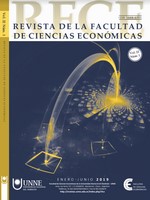Modelo didáctico para la intervención educativa universitaria, en contabilidad y en ambientes tecnológicos
DOI:
https://doi.org/10.30972/rfce.2213949Palavras-chave:
B-Learning, Rendimiento, Web 2.0, Docente-Tutor, Análisis Multivariante.Resumo
Es notable la diferencia que se observa entre rendimiento académico deseado y obtenido por estudiantes. La relevancia de las relaciones entre enseñanza, aprendizaje, uso de tecnologías y rendimiento académico vienen dadas por su impacto en el desarrollo humano de los países, su importancia en la agenda pública, la invisibilidad del tema, su vacancia científica y la trascendencia local. En este contexto, el propósito de la presente investigación reside en comprobar empíricamente la eficacia del modelo didáctico propuesto. El abordaje es consistente con el paradigma constructivista y las teorías del aprendizaje centradas en el alumno. El anclaje institucional ha justificado métodos no probabilísticos de selección poblacional y extracción aleatoria de la muestra aceptante; conformada por 118 estudiantes (mujeres 60.17%), con una media de 21.08 años (DE = 3.76), que asistieron en el año 2017 a la Facultad de Ciencias Económicas de la UNNE. El diseño metodológico es inicialmente explicativo, correlacional y descriptivo mediante encuesta; es de naturaleza cuasi-experimental, emplea la técnica del cuestionario en trabajo de campo, es también prospectivo y multimodal, predominantemente de línea cuantitativa. Los resultados obtenidos permiten afirmar: la modalidad semipresencial (MSP) como estrategia de enseñanza incide en el rendimiento académico medido a través de calificaciones; la habilidad socio-tecnológica es un conocimiento socialmente construido y valorado, que no se observa en los exámenes tradicionales; la MSP es un logro compartido. Finalmente, las elecciones y valoraciones provistas por alumnos confirmaron las decisiones del equipo docente
Downloads
Publicado
Como Citar
Edição
Seção
Licença
La Revista de la Facultad de Ciencias Económicas solicita sin excepción a los autores una declaración de originalidad de sus trabajos, esperando de este modo su adhesión a normas básicas de ética del trabajo intelectual.
La Revista de la Facultad de Ciencias Económicas de la Universidad Nacional del Nordeste, Argentina, declara e informa que no se aplica a los autores ningún cargo ni costo, por la publicación de los artículos. La distribución y acceso, son de carácter libre y gratuito.
Este obra está bajo una licencia una licencia de Creative Commons Reconocimiento-NoComercial-SinObraDerivada 4.0 Internacional.





